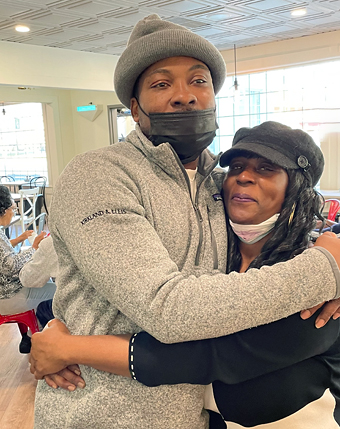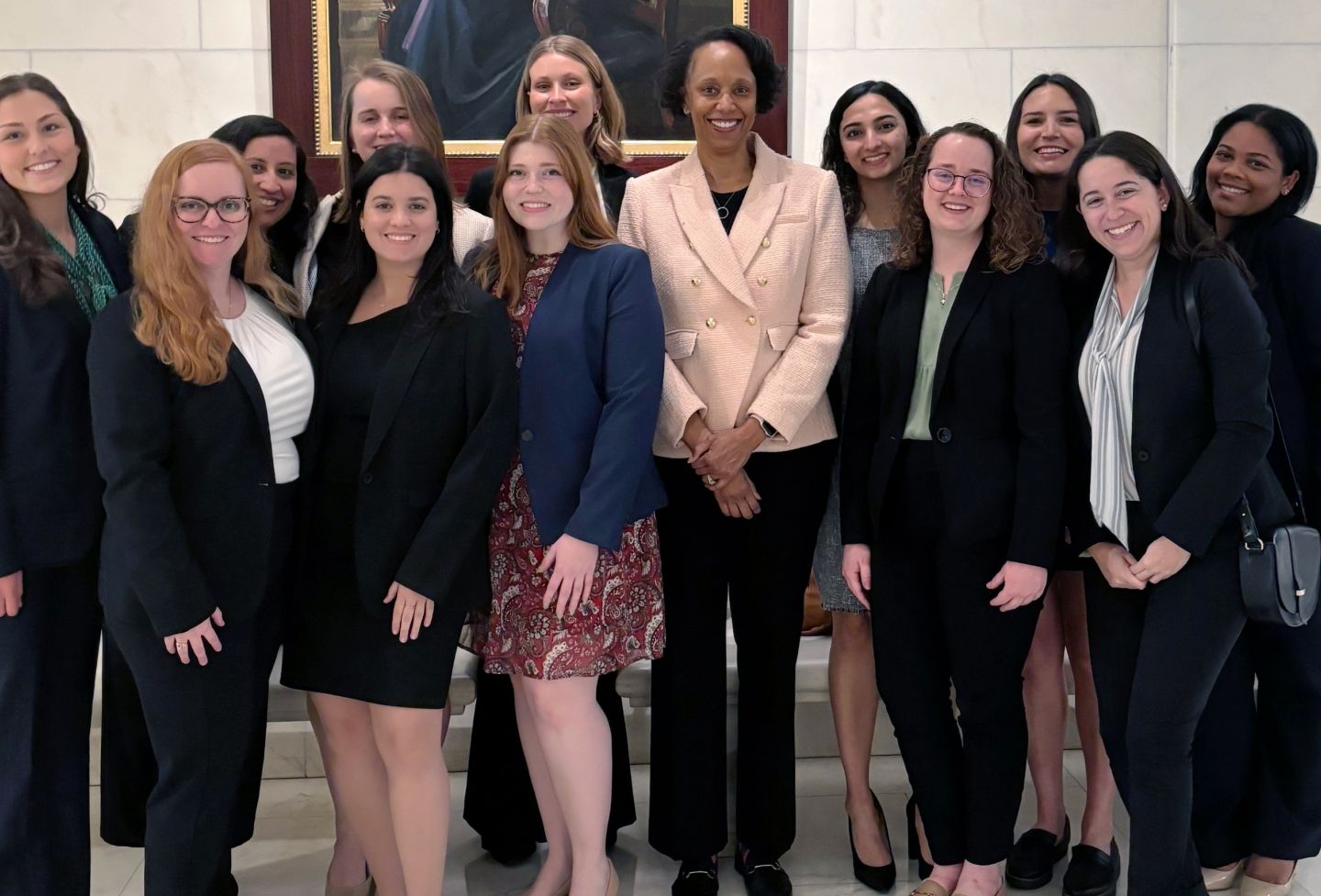The reunion was no less emotional for being small and informal. On the cold, sunny morning of Jan. 4, Lamar Edward Barnes stepped out of the Sussex II state prison in Waverly, Virginia, and into the embrace of waiting family members. For the first time in two decades, he was a free man.
He also turned and hugged two of the people who helped secure his release from prison for a crime he did not commit: Professor Jennifer Givens, director of the Innocence Project at the University of Virginia School of Law, and associate director and Professor Juliet Hatchett ’15. A third member of the team, Simonne Brousseau ’20, was delayed by bad weather but present in spirit. Also present — but watching from afar because he had COVID-19 — was Zach Gaver ’20, a former clinic student who worked on the case for more than two years.
“Everyone was joyful,” Hatchett recalled. “It’s not the sort of event that you ever get used to.”
After several years of investigation and advocacy by the clinic, Barnes received a pardon from Gov. Ralph Northam in the final days of his term. “This absolute pardon reflects Barnes’ innocence of the convictions handed down to him ….,” the governor’s office said in a statement.

Barnes had spent almost 20 years behind bars after being charged in early 2002 with killing Amy McRae and wounding her fiancé, Mark King, at a house in Portsmouth. McRae died but her unborn baby and King survived. Barnes, who has maintained his innocence from the beginning, was convicted in August 2003 of first-degree murder, malicious wounding and firearms charges, and was sentenced to life without parole plus 28 years.
The case came to the attention of the clinic only in 2018, Hatchett said. Brousseau and Gaver assisted Givens and Hatchett, first as students in the for-credit Innocence Project class, and later through the Innocence Project’s pro bono clinic. After finishing a clerkship, Brousseau rejoined the team, working pro bono as an associate with the Washington, D.C., office of the law firm Faegre Drinker.
Conducting a comprehensive investigation, the Innocence Project team was able not only to rebut the commonwealth’s evidence against Barnes but to establish an affirmative alibi as well. All three surviving victims, who were the primary witnesses against Barnes at trial, recanted their testimony. Two, who were teenagers at the time, admitted that they had never known the actual gunman’s identity and had succumbed to prosecutorial pressure to identify Barnes at trial. King, who survived a gunshot wound to the head, was adamant that Barnes was not the man who shot him or his fiancé, swearing in a statement that he had only identified Barnes because prosecutors threatened him with prison to secure his testimony.
The team also found witnesses who swore that Barnes was never at the scene of the crime, though Barnes’ court-appointed lawyer had not called them to testify at trial. These witnesses explained that Barnes was playing video games at an apartment complex at the time of the shooting and that an alternate suspect had committed the crime. Provided access to Barnes’ file by the current commonwealth’s attorney in Portsmouth, the Innocence Project lawyers discovered that prosecutors had committed misconduct, suppressed exculpatory evidence and failed to disclose that the alternative suspect was cooperating with local police.
Armed with this evidence, the project submitted Barnes’ case to the Virginia Office of the Attorney General’s Conviction Integrity Unit, which began its own investigation early last year and also concluded that Barnes was innocent. The project filed for a writ of habeas corpus in state circuit court as well as a petition for a writ of actual innocence in the Virginia Court of Appeals. While those actions were pending, Northam intervened and awarded Barnes a pardon Jan. 4.
The case is one of several recent victories for the Law School’s Innocence Project. Just in the month of January, two other clients — Eric Weakley and Jervon Tillman — received full pardons from Northam, and two additional clients — Kevin “Suge” Knight and Gilbert Merritt – were released from prison on conditional pardons. Founded in 2008 at the urging of now-UVA President Jim Ryan ’92, then vice dean, in coordination with then-Dean John C. Jeffries ’73, the Innocence Project offers a yearlong, for-credit class in which students gain practical experience investigating and litigating wrongful convictions across the commonwealth. Students can also participate in a separate, non-credit pro bono clinic. In 2019, the project launched a policy team to advocate for more systemic reforms to Virginia’s criminal justice law.
“This case was incredibly important to me,” said Brousseau, who spent more than two years working on it. “Every finding pointed towards [Barnes’] innocence.”
Securing a prisoner’s release is not the final step in the project’s work, however. They also try to put support networks in place to help newly released clients reenter society. The project’s website, for example, posts a link to Barnes’ Amazon wish list so interested people can buy items such as clothing or gift cards to help him get back on his feet.
“I feel good, son, I’m talking about real good. I don’t even have the words to explain it,” Barnes said on his cousin’s Facebook Live video shortly after his release. That’s the sort of response that means everything to Givens, Hatchett and their students.
“Our work can be massively depressing,” Hatchett acknowledged. “You see horrible suffering and tragedy. But you can also see victories — like this one — against all odds. That is what gets us in here every day.”
Founded in 1819, the University of Virginia School of Law is the second-oldest continuously operating law school in the nation. Consistently ranked among the top law schools, Virginia is a world-renowned training ground for distinguished lawyers and public servants, instilling in them a commitment to leadership, integrity and community service.


